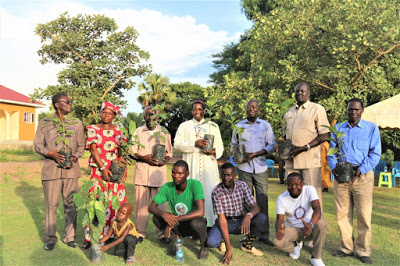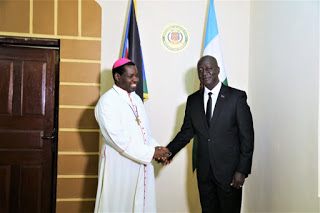SOUTH SUDAN: Tombura-Yambio Diocese Embarks on Tree Planting Mission for Food, Economic Reasons and Environmental Conservation

Participants during the launch of coffee plantation in the Catholic Diocese of Tombura Yambio with Bishop Hiiboro (Image Courtesy)
Inspired by the spirit of Pope Francis’ Call for care for our common home through his encyclical letter, Laudato Si, the Catholic Diocese of Tombura-Yambio has embarked on planting trees to increase food production, to improve the economic situations of the inhabitants and in the long term to improve the environment.
The initiative started in May this year when Rt. Rev. Edwardo Hiiboro Kussala, Bishop of Tombura Yambio launched a coffee plantation project in the diocese which is situated in the Western Equitoria State, perceived to be within the rain forest of South Sudan.
In May 2019, the Diocese gave coffee seedlings to Government officials, UN representatives, NGOs, faith based organizations, offices and individuals to plant in their various places in Yambio. Additionally, all the 27 parishes of the Catholic Diocese of Tombura–Yambio were tasked to plant at least 1000 coffee trees. The centres or sub parishes were tasked to plant 500 coffee trees while the chapels were tasked to plant at least 250 coffee trees by the end of this year, 2019.
The Bishop further invited members of the general public to visit his residence in Yambio to collect seedlings if they so wished to participate in the initiative.
Speaking to AMECEA Online News in Nairobi, Bishop Hiiboro indicated that he bought seedlings of various fruit trees as well as other useful trees from Kenya, which they intend to plant in his Diocese.
“We are planting oranges, mangoes, avocados, and macadamia in addition to coffee. We are also planting useful trees such mahogany, pines and others which are good for timber. It is important that people think about both the immediate and long term strategies of poverty alleviation,” Bishop Hiiboro explained, adding that the initiative is dubbed, The Green Gold and The Green Oil.
“In a way that oil and the gold are extracted from underground, let our development be on top of the soil by growing things that would provide continual income to the community. Apart from the benefits such as the fruits and timber, tree planting is a way of contributing towards the conservation of the environment. Trees prevent soil soil erosion; planting trees protects the environment from desertification.”
Aware that not far from the Diocese in northern Sudan is a dessert, Bishop Hiiboro expressed that the southern part of the desert is already spreading. Therefore, by planting trees the Diocese is encouraging the people to halt the spreading of desertification and, by so doing, contributing to the conservation of the green part of Africa.

He appreciates the Bishops initiative to launche a revolution of
coffee plantation in his state (Image Courtesy)
“We in South Sudan are actually at the gate between the desert and tropical Africa. Therefore, we don’t want history to blame us for allowing the desert to spread through our own negligence and insensitivity to environmental degradation,” Bishop Hiiboro who is also the president of Sudan and South Sudan Catholic Bishops Conference expressed adding that so far over 200,000 trees have been planted in Western Equitoria since the initiative began.
“Apart from parishes, sub-parishes and other Church institutions, we are encouraging families to plant at least 20 or more trees depending on their capacity. Therefore, there is no monopoly that the trees are only planted in the land of the Church but rather everybody is encouraged to do so as a best practice.”
Bishop Hiiboro said that although the initiative was started by the Diocese, it has been taken up by the State. As such there is a collaboration between the Church, Government and international communities, some of which have joined by financially supporting the initiative especially the UNEP and the UNDP.
“Poverty destroys the environment. When we don’t plant trees, the ones that are already there are being depleted as people cut them for firewood and charcoal. Therefore, if we don’t encourage people to plant more trees, soon or later the place will become a desert.”
∽End∽
By Pamela Adinda, AMECEA Online News


